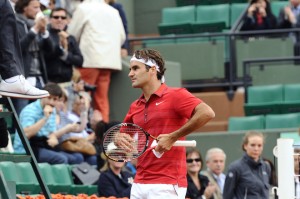For the rest of their lives, Roger Federer and Stan Wawrinka will share a special bond. The two Swiss, who will play against each other in the round of 16 of Roland Garros Sunday, paired on the same side of the court to achieve one of the ultimate goals of any athlete. Rene Stauffer, in his book ROGER FEDERER: QUEST FOR PERFECTION ($19.95, New Chapter Press, www.RogerFedererBook.com) takes readers back to Federer and Wawrinka’s golden moment at the 2008 Olympics in Beijing.

It did not take long for Federer to experience another bitter defeat. It came at the Olympic Games in Beijing, where Federer hoped to achieve a major goal for his season—and his career—by winning Olympic gold in singles. He was one of the super stars of the Games and facilitated autographs and photograph requests to countless athletes throughout the event. In the quarterfinals, his dreams of winning the singles tournament came to a crushing end when he lost 6-4, 7-6 (2) to American James Blake, a player he had beaten in all eight previous matches.
While Federer’s critics debated his loss to Blake, something unexpected happened. Paired with his young countryman Stanislas Wawrinka, he began a run in the men’s doubles competition. Wawrinka, from the west part of Switzerland who fought his way into the top 10 singles rankings, had won only one of three doubles matches with Federer prior to the Games. They defeated the strong Indian team of Leander Paes and Mahesh Bhupathi en route to the semifinals, where they upset the No. 1 seeds and gold-medal favorites Bob and Mike Bryan of the United States. From there, they could not be stopped and defeated Sweden’s Simon Aspelin and Thomas Johansson in the gold medal match. After the 6-3, 6-4, 6-7 (4), 6-3 victory, the two Swiss embraced each other as Olympic champions. They celebrated doing their unique “fire dance” where Federer warmed his hands by his partner who lay on his back and pretended to be a campfire, to symbolize how hot he was. Compared to the singles gold that Rafael Nadal eventually won, many people looked at Federer and his doubles gold merely as a consolation prize. This was particularly the case in Switzerland, even though cyclist Fabian Cancellara earned the only other gold medal for the country. “How was Christmas back in the days?” wrote a commentator from one of the biggest newspapers in Switzerland. “We were excited like little children for the newest toy but got two pairs of wool socks instead.”
What the doubles victory meant to Federer was immediately seen at his next tournament, the US Open, which started only eight days after the end of the tennis event in Beijing and on the other side of the globe. Federer arrived in New York totally exhausted. For four days, he did not want to move at all. His body refused to work after a brutal summer, a 12-hour time difference and adjusting from the Olympics to the US Open.
“To process Olympic gold is almost harder for me than a Grand Slam title,” he said. “It was an unbelievable moment. Every time I see Stan we both can barely believe it”.
